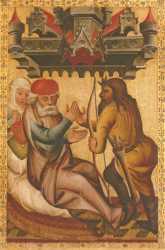Esau
"Hairy." The first-born twin son of Isaac and Rebecca,1 and brother of Jacob. The circumstances connected with his birth foreshadowed the enmity which afterwards subsisted between the twin brothers and the nations they founded.2 Esau was much loved by his father.
In process of time Jacob, following his natural bent, became a shepherd; while Esau, a "son of the desert," devoted himself to the perilous and toilsome life of a huntsman. On a certain occasion, on returning from the chase, urged by the cravings of hunger, Esau sold his birthright to his brother for bread and pottage of lentils.3 The name of Edom, "Red", was given to him from his conduct in connection with the red lentil pottage.
At the age of forty years, to the great grief of his parents, he married two Canaanitish maidens, Judith, the daughter of Beeri the Hittite, and Bashemath, the daughter of Elon.4
The next episode in the life of Esau is the loss of his father's covenant blessing.5 Isaac, who was by then old and blind, asked Esau to go out in the field and bring him some venison, and he would bless his son when he returned. Rebecca overheard them and felt that the blessing should go to Jacob, since she was told that Esau should serve Jacob. She prepared a savory meal from the kids of goats, gave Jacob one of Esau's garments, and put goat skin on his hands. Jacob then brought the meat to Isaac and pretended to be Esau. The old man heard Jacob's voice, but as the shirt smelled of the field and the hands where hairy like Esau's, Isaac gave him his blessing. Esau returned shortly after and when he discovered the deceit he vowed vengeance upon his brother.
Fearing for Jacob's life, Rebecca sent him away to Padan-aram. During his brother's absence, Esau tried to conciliate his parents6 by marrying his cousin Mahalath, the daughter of Ishmael. This led him to cast in his lot with the Ishmaelite tribes; and driving the Horites out of Mount Seir, he settled in that region. After some thirty years' sojourn in Padan-aram Jacob returned to Canaan, and was reconciled to Esau, who went forth to meet him.7 Twenty years after this, Isaac their father died, when the two brothers met, probably for the last time, beside his grave.8 Esau now permanently left Canaan, and established himself as a powerful and wealthy chief in the land of Edom.
Long after this, when the descendants of Jacob came out of Egypt, the Edomites remembered the old quarrel between the brothers, and with fierce hatred they warred against Israel.
❧
References
Notes
Source
- Easton, M.G. (1897). Easton's Bible Dictionary. New York: Harper & Brothers.
This article incorporates text from Easton’s Bible Dictionary (1897) by M.G. Easton, which is in the public domain.
